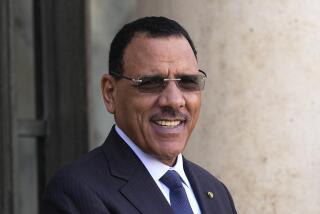U.S. Reaffirms Aquino Support, Plans No Action
- Share via
WASHINGTON — The Reagan Administration reaffirmed its support for Philippine President Corazon Aquino on Sunday but concluded that, at least for the moment, she does not need outside help to put down an attempted coup by elements loyal to ousted President Ferdinand E. Marcos.
Despite suggestions that the attempted countercoup was staged on Marcos’ orders, U.S. officials were reluctant to tie the former president directly to the incident.
“The Aquino government seems to have the situation in hand,” a senior Administration official said. “We’re watching things on the ground to be sure.”
Asked if the United States plans to take any action in support of Aquino, the official, who asked not to be identified by name, quipped: “What do you want us to do, send in the Marines?” He added quickly, “They (Aquino and her government officials) are big people and they can take care of themselves.”
A Surprise to U.S.
The effort by Arturo Tolentino, Marcos’ vice presidential running mate in the disputed February election, to declare himself acting president apparently took the U.S. government by surprise. Many top officials were away from Washington for the Fourth of July holiday weekend, and those who remained in the capital were reluctant to discuss the situation in detail.
The only official U.S. government reaction was contained in a single sentence read to reporters by State Department spokesman Joseph Reap: “The United States strongly supports the government of President Aquino and is against efforts such as these to undermine it.” A similar statement was issued by the embassy in Manila.
Any role of Marcos in encouraging the attempted coup from his exile home in Hawaii would be a sharp embarrassment to the U.S. government. However, the senior official said that Washington has no plans now to gag Marcos or expel him from the United States.
Although Tolentino said during his oath-taking ceremony Sunday that he was acting on instructions from Marcos, the senior U.S. official said there is no proof as yet that Marcos had a hand in the attempted countercoup.
Secretary of State George P. Shultz said during his trip to the Philippines last month that the Administration is reluctant to restrict Marcos’ political activities because that would be a violation of freedom of the press and freedom of speech. However, Shultz said the Administration might take action if Marcos incites violence.
U.S. Wishes He’d Leave
Shultz said last month that the United States would prefer that Marcos leave Hawaii and seek asylum in some other country. But so far, no other nation has said it would accept him. Ghana announced Sunday that it would not let Marcos live there.
The official Accra radio said reports suggesting that Marcos would be granted asylum in Ghana were “outright fabrication.”
The senior U.S. official said Sunday that the United States still wants Marcos to move on, but “you can’t go somewhere where people don’t want you to go.”
Moreover, the Aquino government has canceled Marcos’ passport. Aquino has said that she would prefer that Marcos remain in the United States because she does not want to risk his return to the Philippines.
Marcos Role Denied
Meanwhile, a Marcos spokesman in Hawaii said that the former president would return to the Philippines as an “elder statesman” if the Tolentino countercoup were successful, United Press Internataional reported from Honolulu.
Joe Lazo, the spokesman, said Marcos knew nothing in advance of Tolentino’s plans.
“I hope they don’t blame him,” Lazo said.
Lazo added that Marcos would not attempt to resume his post as president even if Tolentino were to succeed in assuming power. He said that Tolentino would be the president in those circumstances.
The United States has been a strong supporter of Aquino since she assumed office in February after the election that U.S. observers said she won despite official returns showing a Marcos victory.
While in Manila last month, Shultz said repeatedly that he is optimistic that the Aquino government will be able to solve the country’s pressing economic and social problems, which he said were all left over from the Marcos years.
More to Read
Sign up for Essential California
The most important California stories and recommendations in your inbox every morning.
You may occasionally receive promotional content from the Los Angeles Times.










